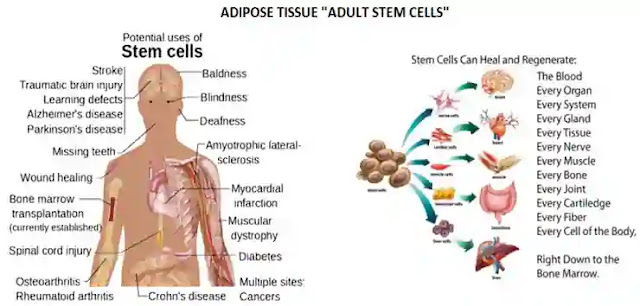stem cells impact factor |( stem cells translational medicine | stem cells pros and cons )
Immature microorganisms
Undifferentiated organisms are the unrefined components for other body cells. They are viewed as unrefined substances, since any remaining cells with specific capabilities are produced from these cells.
All in all, immature microorganisms are unspecialised cells which have not yet formed into full grown, particular cells. These cells can form into various, specific body cells.
�Stem cells have the accompanying two significant properties:
1. Capacity of self-recharging: The capacity of immature microorganisms to go through various patterns of cell division while keeping up with the undifferentiated state is called self-restoration. Under the right circumstances in the body or a research center, immature microorganisms gap to frame more cells called little girl cells.
These little girl cells either become new immature microorganisms (self-restoration) or become particular cells (separation) with a more unambiguous capability. No other cell in the body has the innate capacity to create new cell types.
2. Capacity to practice: The undifferentiated organisms have the ability to separate into particular cell types. They can practice into different body cells types, for example, platelets, synapses, heart muscle or bone.
Wellsprings of Undifferentiated cells
Undifferentiated organisms are gotten from the accompanying different sources:
1. Early stage foundational microorganisms: These undeveloped cells come from incipient organisms, three to five days after origination. At this stage, an incipient organism is known as a blastocyst and has around 150 cells. These immature microorganisms are pluripotent foundational microorganisms, meaning they can separate into more undifferentiated cells or can turn out to be any sort of cell in the body. Consequently, these immature microorganisms can be utilized to recover or fix infected tissues and organs.
2. Grown-up immature microorganisms: These undeveloped cells are tracked down in little numbers in most grown-up tissues, like bone marrow or fat. Contrasted with undeveloped immature microorganisms, grown-up undifferentiated organisms have a restricted capacity to practice into different cells of the body. For example, bone marrow foundational microorganisms might have the option to make bone or heart muscle cells, however not nerve cells. The examination including utilization of grown-up undifferentiated cells is going through clinical preliminaries to test its convenience and wellbeing in individuals. For instance, grown-up immature microorganisms are right now being tried in individuals with neurological or coronary illness.
Researchers have likewise effectively changed ordinary grown-up cells into immature microorganisms utilizing hereditary reconstructing. By adjusting the qualities in the grown-up cells, scientists can reprogramme the cells to act much the same way as undeveloped undifferentiated organisms. These foundational microorganisms are called actuated pluripotent undifferentiated cells. Nonetheless, analysts are yet to be aware if these reinvented cells will cause unfriendly impacts in people.
3. Perinatal undifferentiated organisms: Perinatal means connecting with time, normally various weeks, preceding and after birth. Scientists have found undifferentiated organisms in amniotic liquid notwithstanding umbilical rope blood undeveloped cells. These undifferentiated organisms additionally can change into particular cells. Clinical preliminaries are attempted to figure out the capability of amniotic liquid undifferentiated cells.
Totipotent, Pluripotent and Multipotent Cells
Totipotent cells can be specific into all cell types in a body with the expansion of extra-undeveloped or placental cells. Early stage cells inside the initial two cell divisions after preparation are the main cells that are totipotent.
Pluripotent cells can be particular into all the cell types that make up the body; undeveloped immature microorganisms are considered pluripotent.
Multipotent cells can be formed into more than one cell type, however their capacity to practice is more restricted than pluripotent cells. Grown-up foundational microorganisms and umbilical string
blood undeveloped cells are viewed as multipotent.
Undifferentiated cells have the accompanying applications:
1. Expanded comprehension of how illnesses happen: By watching immature microorganisms mature into cells in bones, heart muscles, nerves and different organs and tissue, specialists and specialists might better comprehend how sicknesses and conditions create.
2. Produce sound cells to supplant ailing cells (regenerative medication): Foundational microorganisms can be directed to become explicit cells that can be utilized to recover and fix sick or harmed tissues in individuals. Individuals who could profit from undifferentiated cell treatments incorporate those with spinal line wounds, Type 1 diabetes, Parkinson�s illness, Alzheimer�s sickness, coronary illness, consumes, malignant growth and osteoarthritis.
3. Test new medications for security and viability: Prior to involving new medications in individuals, a few kinds of undifferentiated organisms are helpful to test the wellbeing and nature of investigational drugs. For testing of new medications, the cells are modified to obtain properties of the kind of cells to be tried. For example, nerve cells could be produced to test another medication for a nerve infection. Tests could show whether the new medication meaningfully affected the cells and whether the cells were hurt.
Moral Issues in the Utilization of Undifferentiated cells
Undeveloped undifferentiated organisms are gotten from beginning phase embryos�a gathering of cells that structures when a woman�s egg is treated with a man�s sperm. Hence, the utilization of incipient organisms to get undeveloped cells is gone against by a few strict bodies which accept that life starts following preparation.
Issues with the Utilization of Grown-up Undifferentiated cells
Grown-up foundational microorganisms have restricted capacity to practice, which limits how grown-up undeveloped cells can be utilized to treat illnesses.
Grown-up foundational microorganisms are likewise bound to contain irregularities like poisons, or from blunders gained by the phones during replication.







